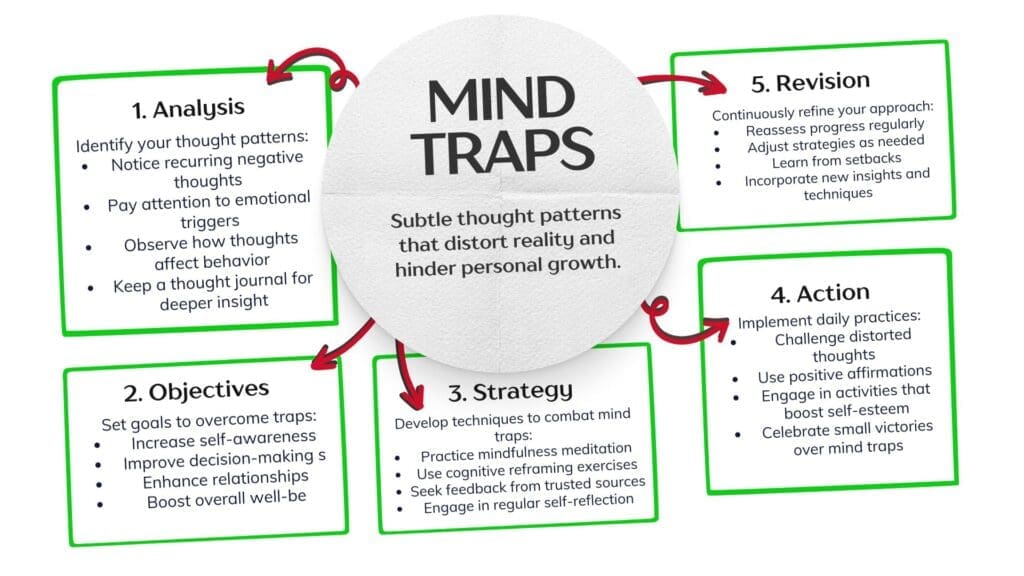The Hidden Puppeteers of Your Psyche: What are Mind Traps
As a neuroscience-based life coach, I’ve witnessed countless individuals grappling with invisible forces that seem to hold them back. These forces, which I call “mind traps,” are insidious thought patterns that can distort our perception of reality and hinder our personal and professional growth. In my years of practice, I’ve not only helped clients navigate these treacherous mental landscapes but also embarked on my own journey of self-discovery and liberation from these cognitive snares.
Mind traps are not just abstract concepts confined to psychology textbooks. They are real, pervasive, and can have profound implications on our daily lives. From my personal struggle with perfectionism to the countless sessions where I’ve seen clients breakthrough their mental barriers, I’ve come to understand the true power and potential damage of these thought patterns.
In this comprehensive exploration, we’ll dive deep into the world of mental blindfolds, uncover their hidden mechanisms, and equip ourselves with the tools to break free from their grasp. Whether you’re a professional seeking to enhance your performance, an individual on a personal growth journey, or simply someone curious about the workings of the human mind, this article will provide valuable insights and practical strategies to help you navigate the complexities of your own thoughts.
Unmasking the Tricksters: Common Mind Traps
The All-or-Nothing Pitfall
One of the most pervasive mindset obstacles I’ve encountered, both in my practice and personal life, is all-or-nothing thinking. This trap paints our world in stark black and white, leaving no room for nuance or middle ground. I remember a time when I viewed my own performance as either perfect or a complete failure. This mindset not only stifled my growth but also led to intense anxiety and self-doubt.
Many of my clients have fallen into this trap as well. I once worked with a talented artist who would abandon projects at the slightest perceived imperfection. By helping her recognize the spectrum between success and failure, she was able to complete more works and find joy in the process of creation, rather than fixating solely on the end result.
The Overgeneralization Quicksand
Overgeneralization is another mind trap that can quickly pull us under. It’s the tendency to take a single negative event and use it to predict a never-ending pattern of defeat. I’ve seen this trap ensnare countless clients, causing them to give up on their goals after a single setback.
I, too, have been caught in this quicksand. Early in my career, after receiving criticism on a presentation, I began to doubt my ability to speak publicly. It took conscious effort and reframing to recognize that one subpar performance did not define my capabilities as a speaker.
The Mental Filter Fog
The mental filter trap is like wearing glasses that only allow you to see the negative aspects of any situation. It’s a selective focus that can cloud our judgment and obscure opportunities for growth and happiness.
One of my clients, a successful entrepreneur, was constantly stressed and dissatisfied despite her achievements. Through our work together, we discovered that her mental filter was causing her to focus solely on minor setbacks, completely overlooking her numerous successes. By learning to widen her perspective, she was able to find more satisfaction in her work and life.
The Emotional Reasoning Rollercoaster
Emotional reasoning is a particularly tricky mind trap that equates feelings with facts. “I feel like a failure, therefore I am a failure” is a classic example of this trap in action. This can lead to a rollercoaster of emotions dictating our actions and self-perception.
I’ve grappled with this trap myself, allowing anxious feelings to convince me that I wasn’t prepared for important meetings or presentations. It took practice and mindfulness to separate my emotional state from the objective reality of my preparedness and capabilities.

The Ripple Effect: How Mind Traps Impact Our Lives
Decision-Making in the Dark
Mental misconceptions can significantly impair our ability to make sound decisions. When caught in these mental snares, we may give undue weight to certain information while ignoring crucial data. This can lead to choices that seem appropriate in the short term but have negative long-term consequences.
I once worked with a client who, due to the all-or-nothing trap, was paralyzed when faced with career decisions. She viewed each choice as either the perfect path or a catastrophic mistake, unable to see the potential for growth and learning in any direction she might choose.
Relationships on the Rocks
Our interpersonal dynamics can suffer greatly when we’re entangled in mind traps. Misinterpretations arising from these distorted thought patterns can lead to communication breakdowns, eroded trust, and strained relationships.
In my own life, I’ve noticed how the overgeneralization trap used to affect my personal relationships. One disagreement would spiral into catastrophic thinking about the entire relationship, causing unnecessary stress and conflict.
Self-Perception Distorted
Perhaps one of the most damaging effects of cognitive glitches is how they warp our self-perception. A distorted self-image can erode confidence, hinder personal growth, and create a negative feedback loop where we continuously seek out information that confirms our skewed beliefs.
I’ve seen clients with immense potential held back by their distorted self-perception. One particularly memorable case was a brilliant software engineer who, due to the mental filter trap, could only focus on his few failures, completely discounting his numerous innovations and successes.

Breaking Free: Strategies to Overcome Mind Traps
The Power of Self-Awareness
The first step in overcoming thinking traps is recognizing their presence. Self-awareness is the cornerstone of personal growth and the key to unlocking the chains of distorted thinking.
I encourage my clients to practice regular self-reflection, and I do the same in my own life. Keeping a thought journal can be an invaluable tool in identifying recurring patterns of trapped thinking. By documenting our thoughts, feelings, and reactions to various situations, we can gain insight into our thought processes and spot potential mind traps.
The Feedback Loop: Seeking Outside Perspectives
Sometimes, we’re too close to our own thoughts to see them clearly. This is where seeking feedback from others becomes crucial. I’ve found both in my practice and personal life that open communication with trusted individuals can provide diverse perspectives, helping us see situations more holistically and counteract personal biases.
I often recommend that my clients establish a support network of mentors, friends, or family members who can offer honest, constructive feedback. This external input can be invaluable in challenging our distorted beliefs and offering fresh viewpoints.
Fact-Checking Your Thoughts
One of the most effective strategies I’ve employed in combating mind traps is the practice of fact-checking our thoughts. I absolutely love this one and I use it all the time in my own life. When we find ourselves caught in a potential trap, it’s essential to step back and examine the evidence objectively.
I teach my clients (and practice myself) to ask questions like:
- What evidence supports this thought?
- What evidence contradicts it?
- Am I basing this belief on facts or feelings?
- How would I view this situation if it were happening to a friend?
This analytical approach can help separate fact from fiction and lead to more balanced, reality-based thinking.
Mindfulness: The Anchor in the Storm
Mindfulness and meditation have been game-changers both in my personal journey and in my work with clients. These practices encourage us to stay present, focusing on the current moment without judgment. This can help us recognize distorted thoughts as they arise and address them in real-time.
I’ve seen remarkable transformations in clients who have incorporated mindfulness into their daily routines. Not only does it help in identifying and challenging mind traps, but it also reduces overall stress and anxiety, which are often breeding grounds for distorted thinking.
Reframing: The Art of Shifting Perspectives
Reframing is a powerful tool in our arsenal against mind traps. It’s not about denying reality or forced positivity, but rather about shifting our perspective to see a fuller picture that encompasses both challenges and opportunities.
The Reframing Process
- Identify the Trap: Recognize when you’re caught in a mind trap. Is your thinking absolute? Are you overgeneralizing?
- Challenge the Thought: Question the validity of the distorted thought. What evidence supports or contradicts it?
- Seek Alternative Views: Consider how others might perceive the situation. What would you tell a friend in a similar scenario?
- Focus on Growth: Instead of dwelling on setbacks, ask yourself what can be learned from the situation. How can this challenge be turned into an opportunity?
I once worked with a client who viewed a project delay as a catastrophic failure. Through reframing, we were able to see the delay as an opportunity to refine the project further, gather more feedback, and ultimately deliver a superior result.

The Road Ahead: Cultivating Long-Term Mental Resilience
Overcoming mind traps is not a one-time event but a continuous journey. It requires ongoing effort, self-reflection, and a commitment to personal growth. Here are some strategies I recommend for cultivating long-term mental resilience:
- Regular Mental Check-ups: Just as we have physical check-ups, schedule regular mental health check-ins with yourself or a professional.
- Continuous Learning: Stay curious about your own thought processes and the latest research in cognitive psychology and neuroscience.
- Practice Compassion: Be kind to yourself as you navigate this journey. Remember, everyone struggles with mind traps at times.
- Celebrate Progress: Acknowledge and celebrate your victories, no matter how small, in overcoming distorted thinking patterns.
Illuminating the Path Forward
As we conclude our exploration of mind traps, remember that awareness is the first step towards change. By recognizing these mental snares, challenging our distorted thoughts, and consistently practicing the strategies we’ve discussed, we can break free from the prison of our minds and unlock our true potential.
In my years of practice and personal growth, I’ve seen remarkable transformations in individuals who have committed to this journey of mental liberation. It’s not always easy, but the rewards – clearer thinking, better decision-making, improved relationships, and enhanced well-being – are immeasurable.
As you move forward, carry with you the knowledge that your mind is both the lock and the key. With patience, practice, and persistence, you have the power to reshape your thought patterns and create a life of greater clarity, purpose, and fulfillment.
Remember, the journey of a thousand miles begins with a single step. Your step towards mental freedom can literally start now!
#MindTraps #MentalFreedom #CognitiveReframing #SelfAwareness #PersonalGrowth #NeuroscienceCoaching #MindfulnessMatters #OvercomingObstacles #MindsetShift #EmotionalIntelligence






